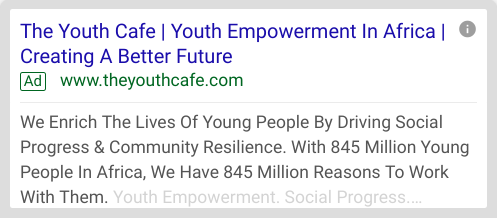“Kenya today is the country where ICLD finances the most partnerships.
”
Between 3rd and 5th of March 2020, the Swedish International Centre for Local Democracy (ICLD) and The Youth Café met to share innovative communication strategies and dissemination approaches at the Municipal Partnership Programme Dissemination conference. The conference was held at the Gelian Hotel in Machakos, Kenya, and was attended by five municipal partnerships between Sweden, Kenya, Tanzania and Uganda.
The Youth Cafe team take a joint picture with ICLD officials after presentation in Machakos.
The Youth Café was there by invitation of ICLD and contributed to discussions and several group activities regarding best practices when it comes to communication and dissemination.
In attendance were five partnership municipalities: Region Vasternoorland and Mombasa, Harryda Municipality and Homa bay county, Robertsfors and Municipality and Machakos County, Strangnas and Dar-Es Salaam, Leksand and Soroti. Each partner municipality had a specific project in which they were involved, ranging from literacy challenges; child and youth involvement in children’s rights; gender equality; youth involvement in city council; and resources for addressing unemployment.
The municipal partnerships were financed by the Swedish International Development Cooperation Agency (SIDA) and were designed to contribute to the development of efficiently functioning democratic local authorities in both the partner countries and Sweden. These municipal partnerships seek to increase civil influence by strengthening local and regional governance organizations in areas such as equity, transparency and citizen participation.
The aim of this conference was to better create solutions through which each partner municipality could reach their audiences, improve their service provision and increase public participation through clear guidelines that would make the target group want to get involved with the cause. Thereafter, if their projects are proven viable, they will receive 100,000 Swedish Krona in funding from the ICLD.
We have initiated the conference to highlight how the performance framework implemented from 2016 has affected the partnerships projects results… The focus during the workshop [was] on the sustainability aspect of projects – how we do share and disseminate good results, how we best communicate about our partnerships externally, what opportunities exist to take the partnership work forward and lift it further?” Emma Olosfon, ICDL Knowledge Officer.
It is the wish of ICLD that the municipalities share good practices that can inspire other municipalities with methods and practices that enhance local democracy through ICLD’s core areas. Moreover, it is important for the municipalities to be able to communicate their message and the objectives of their projects to the citizens.
During a short brainstorming exercise on information dissemination, one of the groups came up with social media advertising as a method of spreading the word about youth involvement in social projects. However, the approach was unrealistic in that they expected to reach about 50,000 followers in a day.
As a matter of fact, all groups except for one mentioned the use of social media; however, they lacked accurate methods of attaining their goal. This is where youth involvement is needed to fill this gap in knowledge in the use of social media marketing.
With eight years of experience, The Youth Café, a youth-run organization, was thus invited to give a presentation on strategic ways in which information could be disseminated to target audiences. The Youth Café, having undertaken extensive research and refinement of their social media methodology, has devised a number of ways in which they have efficiently disseminated information to their target audience.
The Youth Cafe's Executive Director at a past World Bank panel in Washington DC. We use regional and international conferences to communicate and disseminate the results of our work.
The Youth Café stressed the significance of Market Research: who is the target audience? What is the communal setup? What is the language of instruction? Do they stand to benefit from the provided information? How can they get additional information? Answering these questions would help guide organizations in coming up with the right kind of information that will most importantly have the user in mind, not the service provider.
The Youth Cafe also showed short video formats it uses to spread its results and how it works with advocacy work, such as this.
In Africa alone, young people number 845 million: at The Youth Café, we believe that this gives the world 845 million reasons to work with them. Given the opportunity, organizations would realize how much young people can quickly acquire, understand and disseminate information: all while coming up with fresher ideas that undeniably widen the outreach spectrum.
Use of online advertisements using or embedded into social media has become more and more efficient. Furthermore, through algorithms, internet search engines can disseminate information via regular consumer searches.
For example, through a partnership with Google, The Youth Café has successfully run an advertisement on the website that has an outreach of 54 countries from all over the world. Making the results of its work pop up easily in search engines.
One of the hundreds of The Youth Cafe's Ads running on Google.
It is also encouraging to note that social media and wider internet advertisements are cost friendly and so organizations do not need a massive marketing budget.
The Youth Café also emphasizes that information should be accessible to anyone from any background. The best way to do this is to make information short and sweet; adverts should offer a creative way in which information is taken in quickly and piques interest. In conclusion, information dissemination can be quite effective if sufficient time and creativity is taken into developing the end product.
Through The Youth Café’s various contributions to the conference, a number of delegates became interested in our organization’s work. In addition to our work on youth and social media marketing, conference delegates were keen to understand if The Youth Café was involved in helping young people understand current affairs such as the ongoing Building Bridges Initiative in Kenya. Our Executive Director, Willice Onyango, responded that The Youth Café is indirectly involved in civic education, through conducting research on how the youth understood and felt about the initiative and whether or not they stood to benefit from it.
Overall, the conference was characterized by an atmosphere of curiosity, warmth and an enthusiasm to engage with each other and mutually benefit from the conference. A huge thanks to the ICLD for inviting The Youth Café to join this conference and for granting us space to share our ideas and work with all the delegates.
Written by Candy Florence Obunga. Candy is part of our public relations team and has a background in international relations.
Guest editor: Dr Emma Newport, University of Sussex (UK)
Other updates
Steve and two officials from The Youth Cafe pose for a photo with student leaders of Kisii University after a forum leadership as part of the documentary series.
We are so glad that Steve and Jerry could join us for a series of documentary shooting over the next two weeks. A South Dakota Native, Steve is currently the vice president of Radio and Digital. The station has been named the outstanding news organization in 2014, 2015, 2017,2018 and 2019 by the Indiana Associated Press Broadcasters and the Region 7 overall Excellence Award from the Radio, Television and Digital News Association in 2018 and 2019.
We will be holding interviews at Kisii University, Ekerenyo and a series of interviews with youngsters in Nairobi. We hope to tell your real stories as they are on entrepreneurship, unemployment and your involvement in leadership. As we welcome them to Kenya we already can tell that they are interested in the issues affecting the youth and are fully investing in this documentary. To Steve and Jerry we say ‘Karibu Kenya’ The Youth Café is happy to work with you. The Youth Cafe aims to be an aggregator and a clearinghouse of youth content in the future. We will also be using the documentary to communicate the expected impacts of our Leadership Center.
New "Perspectives" Member blogs
Good news! Our "Perspectives" blog page is now on Google News listing! It has over one 300, 000 combined monthly views on websites, micro-sites, and RSS (a web feed that allows users and applications to access updates to our website. To share your story, tips and expertise with our community, read the full guidelines and submit a pitch for consideration.
Rejoice Maudze writes on why gender mainstreaming is important in peacebuilding fostered by the youths in Africa. Rejo is a Peace Building Researcher with The Youth Cafe and a holder PhD in Conflict Transformation from University of Kwazulu-Natal.
Rumbidzai Ethel Chakacha analyzes the recent UK-Africa Investment Summit and what it means for youths by positing "Masked Reality or Partners in Prosperity?". Rumbi is a native of Zimbabwe and pursues Masters degree in the area of Africa Free Continental Trade Agreement at Cape Peninsula University in South Africa.






